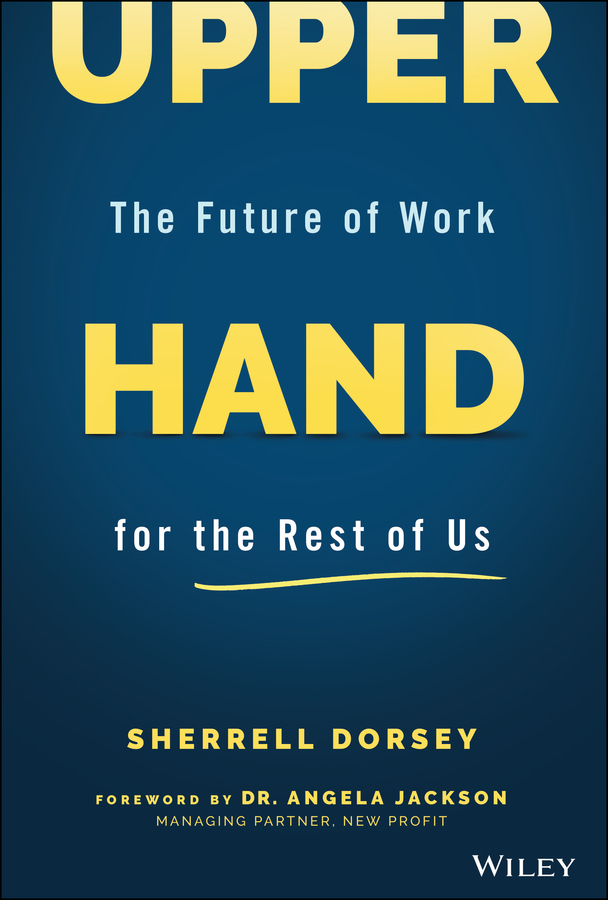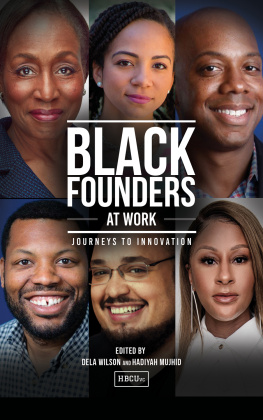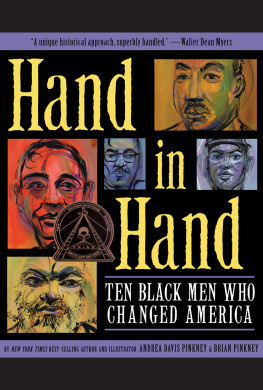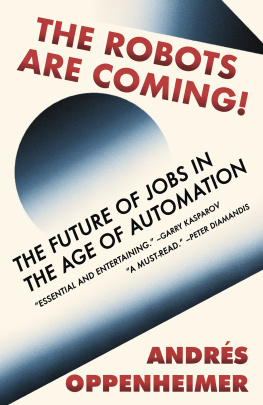
Table of Contents
Guide
Pages
UPPER HAND
The Future of Work for the Rest of Us
SHERRELL DORSEY
FOREWORD BY DR. ANGELA JACKSON
MANAGING PARTNER, NEW PROFIT

Copyright 2022 by John Wiley & Sons, Inc. All rights reserved.
Published by John Wiley & Sons, Inc., Hoboken, New Jersey.
Published simultaneously in Canada.
No part of this publication may be reproduced, stored in a retrieval system, or transmitted in any form or by any means, electronic, mechanical, photocopying, recording, scanning, or otherwise, except as permitted under Section 107 or 108 of the 1976 United States Copyright Act, without either the prior written permission of the Publisher, or authorization through payment of the appropriate percopy fee to the Copyright Clearance Center, Inc., 222 Rosewood Drive, Danvers, MA 01923, (978) 7508400, fax (978) 6468600, or on the Web at www.copyright.com. Requests to the Publisher for permission should be addressed to the Permissions Department, John Wiley & Sons, Inc., 111 River Street, Hoboken, NJ 07030, (201) 7486011, fax (201) 7486008, or online at http://www.wiley.com/go/permissions.
Limit of Liability/Disclaimer of Warranty: While the publisher and authors have used their best efforts in preparing this work, they make no representations or warranties with respect to the accuracy or completeness of the contents of this work and specifically disclaim all warranties, including without limitation any implied warranties of merchantability or fitness for a particular purpose. No warranty may be created or extended by sales representatives, written sales materials or promotional statements for this work. The fact that an organization, website, or product is referred to in this work as a citation and/or potential source of further information does not mean that the publisher and authors endorse the information or services the organization, website, or product may provide or recommendations it may make. This work is sold with the understanding that the publisher is not engaged in rendering professional services. The advice and strategies contained herein may not be suitable for your situation. You should consult with a specialist where appropriate. Further, readers should be aware that websites listed in this work may have changed or disappeared between when this work was written and when it is read. Neither the publisher nor authors shall be liable for any loss of profit or any other commercial damages, including but not limited to special, incidental, consequential, or other damages.
For general information on our other products and services or for technical support, please contact our Customer Care Department within the United States at (800) 7622974, outside the United States at (317) 5723993 or fax (317) 5724002.
Wiley also publishes its books in a variety of electronic formats. Some content that appears in print may not be available in electronic formats. For more information about Wiley products, visit our website at www.wiley.com.
Library of Congress CataloginginPublication Data
Names: Dorsey, Sherrell, author.
Title: Upper hand : the future of work for the rest of us / Sherrell Dorsey.
Description: Hoboken, New Jersey : John Wiley & Sons, Inc., [2022]
Identifiers: LCCN 2021043229 (print) | LCCN 2021043230 (ebook) | ISBN 9781119839293 (cloth) | ISBN 9781119839316 (adobe pdf) | ISBN 9781119839309 (epub)
Subjects: LCSH: MinoritiesEmploymentUnited States. | African AmericansEmployment. | Labor supplyEffect of technological innovations onUnited States. | Manpower policyUnited States. | United StatesEconomic conditions21st century.
Classification: LCC HD8081.A5 D67 2022 (print) | LCC HD8081.A5 (ebook) | DDC 331.6dc23
LC record available at https://lccn.loc.gov/2021043229
LC ebook record available at https://lccn.loc.gov/2021043230
Cover Design: Paul McCarthy
To Grandpa. Thank you for taking every risk and for showing up in the small and big ways that matter.
Foreword
The future of work is already here. Global competition for labor continues to alter the employment landscape in the United States. Technology has enabled the rise of automation in manufacturing, service industries, and even whitecollar professions previously considered safe like finance and marketing. The mass adoption of digital platforms and marketplaces like Uber, TaskRabbit, and DoorDash has fueled the rise of the gig economy and, subsequently, the gig worker. And the COVID19 pandemic disrupted the world of work beyond anything we could have imagined, as millions of workers exited the labor force even as employers face historic talent shortages. It is not hyperbolic to say that America is in the midst of an economic transformation akin to the Industrial Revolution.
Employers and employees alike are finding themselves in unfamiliar territory. While it is tempting to focus our collective effort on returning to business as usual, doing so would effectively leave millions of peopleprimarily Black and Latinxon the sidelines. Already woefully underrepresented in STEM fields, the rapid pace of technological change has had a particularly pronounced impact on Black and Latinx workers and communities. As we stand at a crossroads, ready to chart a new path to a more equitable future, it is crucial that we bridge the gaps that separate us through a multifaceted, multisector approach. We must transform the underlying systems and the mindsets that exacerbate these inequities, which are deeply embedded in the way we invest in technology and innovation, the way we educate our children, and the way we organize our cities and communities.
I first heard Sherrell Dorsey's name at an entrepreneurial conference that brought together entrepreneurs, investors, and thinkers to talk about an often overlooked but thriving world: Black tech. While the Black tech ecosystem is often covered by the media with the assumption of deficits, Sherrell's publication The Plug provides a more nuanced, assetbased view. Its reporting examines the challenges, the successes, and the potential of Black tech from the standpoint of people of color. Sherrell's media company is an irreplaceable source of truth for those of us dreaming of a world of work that works for everyone. Her book is a guide on how to get there.
In Upper Hand, Sherrell shares her experience of two decades navigating the workforce, first as an employee and now as an employer. With a personal touch and rich in anecdotes and examples, she provides insight into the techdriven economy that has largely overlooked Black and brown communities, and also provides recommendations for how the tech ecosystem could diversify, leverage the genius of people of color, and build innovations that benefit everyone.
This book shows what organizational leaders, investors, and workers can do within the current system to make it more equitable. It speaks in an accessible voice to issues that many people of color will readily recognize from their own experience and it brings to the table an experienced, insider view of the tech world. I have drawn on Sherrell's insights many times in my own work leading initiatives to improve the educationtoemployment pathways for people of color.
This indispensable book is a tremendous contribution to our collective effort to navigate the rapidly changing innovation landscape, and it serves as a guide for how industry stakeholders can work together to build a more equitable world of work.
Next page








